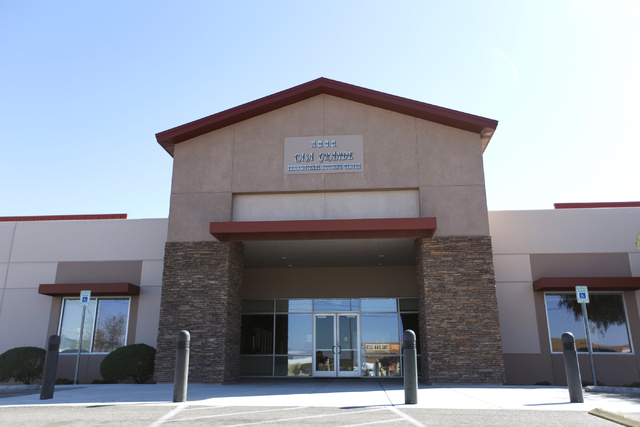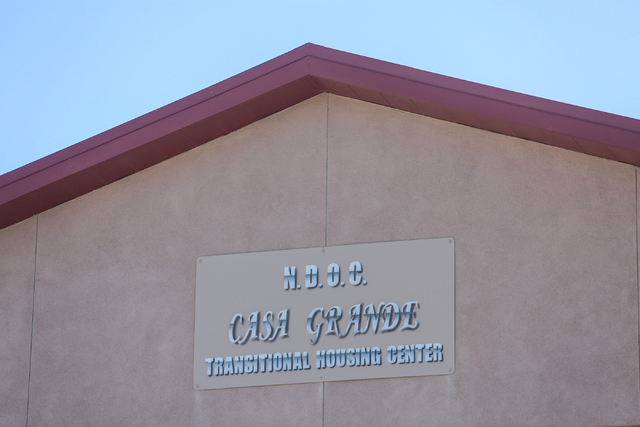‘Big House’ helps Nevada parolees and saves taxpayers’ money




Just off Interstate 15, tucked into an industrial pocket of Las Vegas on Russell Road near Valley View Boulevard, sits a building that’s become part of a solution to a pricey problem.
Although the facility’s Spanish name translates to slang for prison — Big House — the Casa Grande Transitional Housing Facility has become a temporary home to 41 people who aren’t prisoners anymore, even though they sleep every night on prison property.
In October, the state adapted the Nevada Corrections Department’s Casa Grande 400-bed, dormitory-style facility to accommodate prisoners whose poverty prevented their parole.
Five months in, officials are pleased with the program.
The change came after an early 2015 Las Vegas Review-Journal report that taxpayers were paying about $4 million per year to lock up inmates even after the state had ordered their release. In 2014, the parole backlog averaged 365 inmates.
Most prisoners were stuck because they could not come up with a release plan the state deemed acceptable. Those plans must include a place to stay, which usually requires help with money or help from family or friends.
Officials contended the problem was mostly self-imposed, with inmates electing to stay in prison rather than submit to post-release parole restrictions. But statistics from April 2015 showed only 16 percent of those in the backlog had refused parole. Prison reform advocates and other experts said the backlog was a burden on taxpayers and at odds with rehabilitation and public safety goals.
As of March 1, 99 inmates had entered the program at Casa Grande. Forty-two parolees have since found places to live in the community. Additionally, 20 parolees have landed full-time jobs while still living at Casa Grande.
The parolee program started with about 25 parolees, but last week there were 41 parolees at Casa Grande. The goal is to eventually expand to 100 at a given time.
That’s a savings for taxpayers. The Corrections Department estimates it costs about $55 per day to house a prison inmate compared with about $12 per day at Casa Grande — $4 for Corrections plus about $8 a day for Parole and Probation supervision.
Parole and Probation, which falls under the jurisdiction of the Nevada Department of Public Safety, was unable to provide data on the types of crimes Casa Grande parolees had committed, but Lt. Kendall Cummings said the department aims for nonviolent, first-time offenders.
How the state will handle inmates with worse records remains to be seen.
Capt. Tom Ely said the program has gone better than he had expected and it’s been great to see parolees succeed. Some inmates have been sent back to prison because of parole violations, he said, but that’s to be expected. People who aren’t in Casa Grande also violate parole, he said.
This program helps the state shepherd parolees to services to help them increase the odds that they’ll stay out of prison, Ely said.
Some people only needed to stay at Casa Grande for a few days or a week or two while waiting for a first paycheck, getting paperwork in order or reconnecting with someone who has a place for them to stay, he said.
“We’re trying to make sure the parolees have what they need to be a success in the community,” Ely said. “We want them to be productive. We want them to be self-reliant.”
Resembling an apartment complex with dorm rooms rather than cells, Casa Grande was established as a kind of halfway house where prisoners within 18 months of parole could still be incarcerated but have some contact in the community, take classes and get a job. With room to spare, the facility is considered a good fit for the recent parolees.
The 10-year-old facility is often mistaken by passers-by as an ordinary office park and is used for many of the Corrections Department’s administrative needs.
The parolees have more freedom than the inmates who live on the grounds, and are supposed to use the facility as a springboard to a home of their own, ideally within 90 days.
The program helps set up parolees with day-labor jobs so they can earn cash while hunting for full-time employment. Additionally, several parolees qualify for public assistance.
Jason Lujan, 35, said he was grateful for the program. He’s from California, has no family to go to and couldn’t afford a halfway house or an apartment immediately. He came to Casa Grande a few days before Christmas, well after a September parole eligibility date at the end of his prison time for grand larceny and burglary convictions.
Now he’s picking up temporary day-labor jobs while hunting for permanent work and taking advantage of training offered through the program, such as for fork lift operator certification.
“If you want it to work, it will work,” Lujan said. “What you put into it is what you’re going to get out.”
Morris Amburgy, 49, said he was also from out of state. He was eligible to be released on parole in June for a theft conviction, but he stayed locked up because he had no place to go. In October, he was one of the first parolees to go to Casa Grande. Amburgy, who is also getting job training and picking up part-time work, said he’d already be out on his own if he hadn’t had recent open-heart surgery.
Without Casa Grande, both Lujan and Amburgy would have been sitting in prison for months at taxpayer expense until their sentences ran out, at which point they’d have been released with nowhere to go, no resources and no supervision.
“These guys have been really cool to me,” Amburgy said. “If it wasn’t for this program, I’d be on the streets.”
Contact Bethany Barnes at bbarnes@reviewjournal.com or 702-477-3861. Follow her on Twitter: @betsbarnes


















